Training
Upcoming Training & Webinars
Our training streams include qualitative evidence synthesis, scoping reviews and rapid reviews, Cochrane methodology, mixed methods and more.
january 2026
Event Details
Background: This series of workshops will provide reviewers, at the beginning of their journey in conducting a Qualitative Evidence Synthesis (QES)
Event Details
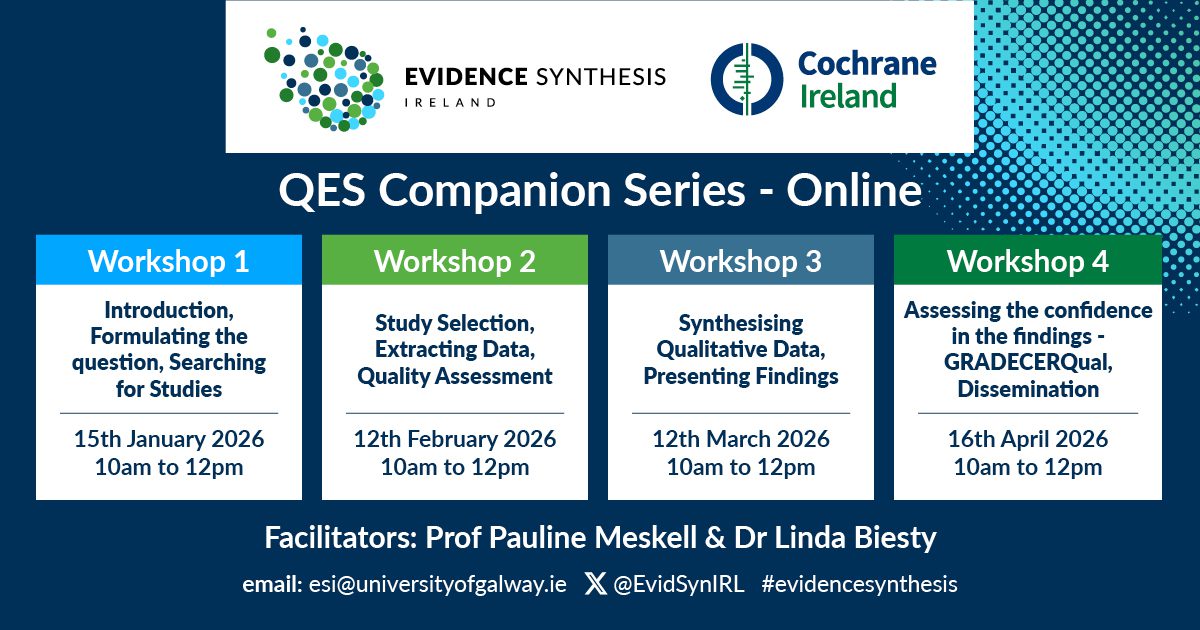
Background:
This series of workshops will provide reviewers, at the beginning of their journey in conducting a Qualitative Evidence Synthesis (QES) with a comprehensive overview of the methodology and methods including a Cochrane QES reviews. The series will offer insights into the development of a protocol, introducing participants to the methods of question generation, identification of included studies, data extraction and synthesis, the GRADECERQual assessment of confidence in the findings, and presentation the review for dissemination.
Aim:
The purpose of these workshops is to familarise all participants with the steps involved in conducting a Qualitative Evidence Synthesis.
We have designed these workshops as a companion series to allow attendees to apply what they have learned, enabling them to gain practical experience before progressing to the next stage of the process.
Objective:
The objectives of the workshops are intended to provide participants with an understanding of the methods of QES and equip them with the practical skills needed to conduct such a syntheses effectively.
Workshop 1: will provide an Introduction to QES, including overview. We will explore how you can focus your review question and search for qualitative evidence.
Workshop 2: will highlight the methods of screening and inclusion processes including selecting studies. We will demonstrate how data are extracted for a QES and a Quality Assessment is conducted.
Workshop 3: will delve into choosing a method of synthesis, and demonstrate how to synthesisinse qualitative data and present the findings
Workshop 4: we will illustrate the process of conducting an assessment of confidence in the findings of the QES using the GRADECERQual approach, and explore methods of writing up a review for dissemination.
Learning outcomes:
The learning outcomes for participants in this series should support them to:
- develop an understanding of the principles of QES and its importance in research
- define a research question suitable for QES
- explore methods for systematically searching and selecting relevant qualitative studies
- develop the skills to assess the quality of qualitative research studies
- gain proficiency in data extraction and methods of qualitative data synthesis
- learn how to conduct an assessment of confidence in the findings of a QES
- explore strategies for presenting and reporting the findings of a QES
Teaching strategies:
The workshops will consist of a mixture of short presentations and discussions led by members of the ESI Teaching Faculty, covering each of the methods of a QES. Breakout rooms will be used for small group activities based around worked examples and exercises. These activities will provide participants with the opportunity to discuss and develop their own skills and understanding. Participants will also be provided with a reading list and additional resources.
Places: 30 places available for individuals who are resident on the island of Ireland
Workshop 1 fee: General €40; Student €20
Overall fee for 4 workshops: General €120; Student €60
Skill level: Introductory
Prerequisites: Knowledge of qualitative research methodologies and methods
Target Audience:
Facilitators
Prof. Pauline Meskell, Head of Department of Nursing and Midwifery, University of Limerick
Dr Linda Biesty, Associate Professor (Midwifery), University of Galway
*If your type of ticket is sold out, please join the waitlist or contact us at esi@universityofgalway.ie
more
Additional Information
More informationRegistration
Click HereTime
(Thursday) 10:00 am - 12:00 pm
Location
ONLINE
Event Details
This workshop will be held over four mornings and provides authors, at the beginning of the systematic review process, with a clear understanding of how systematic reviews of the effects
Event Details
This workshop will be held over four mornings and provides authors, at the beginning of the systematic review process, with a clear understanding of how systematic reviews of the effects of interventions are planned and conducted. It offers an insight into the development of a protocol, introducing participants to methodology, search methods, data extraction, risk of bias assessment and meta-analysis. While the focus is on systematic reviews of the effects of interventions, the principles discussed are likely to be useful to inform steps and approaches in other types of reviews.
Date: 22nd, 23rd, 29th & 30th January 2026
Time: 10.00am – 1.00pm
Places: 25 available for individuals who are resident on the island of Ireland
Fee: General €150; Student €80
Skill level: Introductory
Target Audience: Healthcare professionals, academics, researchers, policy makers and other decision makers, and Evidence Synthesis Ireland fellows who have identified a systematic review of effects of interventions topic and are ready to begin working on their protocol.
Prerequisites: A basic knowledge of health research. Interested in learning more on the methods of a systematic review of effects of interventions.
Teaching strategies: The workshop will consist of a mixture of short presentations led by members of the Evidence Synthesis Ireland and Cochrane Ireland teaching faculty, covering each of the stages of developing a systematic review protocol, small group activities and plenary discussions, providing participants with the opportunity to develop and refine their protocol. Although focusing on systematic reviews of the effects of interventions, the principles are likely to apply to other review types. This course will include blended learning with two months free access to Cochrane Interactive Learning self-directed learning modules, a number of which will be required study prior to the workshop.
Facilitators
Dr KM Saif-Ur-Rahman, Evidence Synthesis Methods Lead, Evidence Synthesis Ireland & Senior Research Fellow, University of Galway.
Ciara Gleeson, Clinical Specialist Physiotherapist, Respiratory Assessment Unit, St. James’s Hospital, Dublin.
Dr Elayne Ahern, Associate Professor, Department of Psychology, University of Limerick
*If your type of ticket is sold out, please join the waitlist or contact us at esi@universityofgalway.ie
more
Additional Information
Click HereRegistration
Click HereTime
22 (Thursday) 10:00 am - 30 (Friday) 1:00 pm
Location
ONLINE
22jan2:00 pm3:30 pmWebinar: Prof. Gordon Guyatt - Core GRADE: Part Two2:00 pm - 3:30 pm ONLINE
Event Details
To register, CLICK HERE GRADE is the world wide standard for rating certainty of evidence in systematic reviews and moving from evidence to recommendations in clinical
Event Details
To register, CLICK HERE
GRADE is the world wide standard for rating certainty of evidence in systematic reviews and moving from evidence to recommendations in clinical practice guidelines. GRADE has, however, become too complicated and the over 50 authoritative GRADE papers are disorganized and increasingly difficult to navigate. In a series of 7 papers published in the BMJ, Gordon Guyatt has led a group of GRADE experts in produce Core GRADE, the essentials of the GRADE process for paired comparisons of interventions. The series provides systematic reviewers and guideline developers with a clear and straightforward guide that includes all they need to produce rigorous systematic reviews and guidelines based on the GRADE process. This second of two webinars will deal with Core GRADE’s approach to inconsistency, indirectness, and moving from evidence to recommendations.
Speaker:
Gordon Guyatt is a McMaster University Distinguished Professor. His work has focused on Evidence-based Medicine. His work has included a key role in the creation of GRADE approach to systematic reviews and practice guidelines, and most recently a series of papers on the essentials of GRADE, Core GRADE in the BMJ. He has published over 1,000 papers many in the top journals and is one of the world’s most cited scientists.
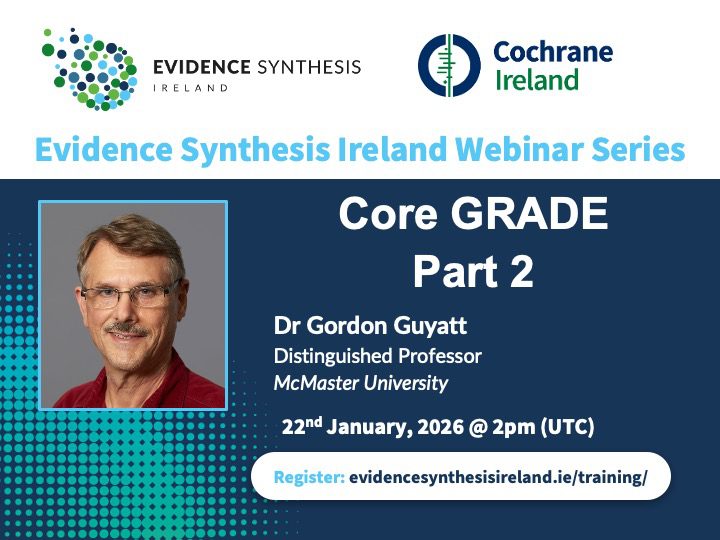
more
Registration
CLICK HERETime
(Thursday) 2:00 pm - 3:30 pm
Location
ONLINE
february 2026
Event Details
To register, CLICK HERE High-quality evidence syntheses are essential for guiding evidence-based healthcare and policy decisions. Yet, an increasing number of methodologically flawed reviews—often single-authored, lacking
Event Details
To register, CLICK HERE
High-quality evidence syntheses are essential for guiding evidence-based healthcare and policy decisions. Yet, an increasing number of methodologically flawed reviews—often single-authored, lacking comprehensive searches, dual screening, proper risk of bias assessment, or certainty-of-evidence evaluation—are being published in peer-reviewed journals. Such practices risk misleading decision-makers, undermining public trust, and diluting the scientific value of evidence synthesis. In this webinar, we will discuss how the peer review and journal editorial process can play a critical role in safeguarding the integrity of evidence synthesis. Drawing on personal and professional experiences, the presenters will outline practical strategies for strengthening peer review and editorial oversight, including enforcing reporting guidelines, improving editorial and reviewer expertise, and exploring the responsible use of artificial intelligence. The session will highlight how rigorous peer review processes can ensure trustworthy syntheses that inform policy, practice, and public understanding.
Speaker:
Dr. David Moher is a senior scientist, Clinical Epidemiology Program, Ottawa Hospital Research Institute, where he directs the Centre for Journalology. Dr. Moher is also a full Professor, School of Epidemiology and Public Health, Faculty of Medicine, University of Ottawa. Dr. Moher received an MSc in epidemiology and PhD in clinical epidemiology and biostatistics. Dr. Moher is a fellow of the Royal Society of Canada, and Canadian Academy of Health Sciences. Dr. Moher works in knowledge synthesis; predatory journals; reporting guidelines; and open science.
Dr. KM Saif-Ur-Rahman specialises in evidence synthesis and health research methods, holding the position of Director of Ireland GRADE Network, Evidence Synthesis Methods Lead at Evidence Synthesis Ireland and Cochrane Ireland, Senior Research Fellow at Center for Health Research Methods, University of Galway, and Honorary Research Senior Lecturer at the College of Medicine Nursing and Health Sciences, University of Galway. He holds an MBBS, an MPH in Epidemiology from Bangladesh, and a PhD in Epidemiology from Nagoya University, Japan. Over the past decade, he has led and contributed numerous evidence syntheses in public health, including systematic reviews, rapid reviews, scoping reviews, and evidence gap maps. His portfolio includes more than 130 peer-reviewed publications, with several Cochrane and methodological reviews as lead or senior author. Dr. Saif is also a dedicated mentor and educator, co-supervising PhD students, leading the Evidence-Based Future Healthcare MSc module at University of Galway, and delivering training across Bangladesh, Japan, and Ireland. He serves as Associate Editor for BMC Systematic Reviews, is a member of the GRADE Working Group, and is Vice-Chair of the University of Galway Research Ethics Committee.
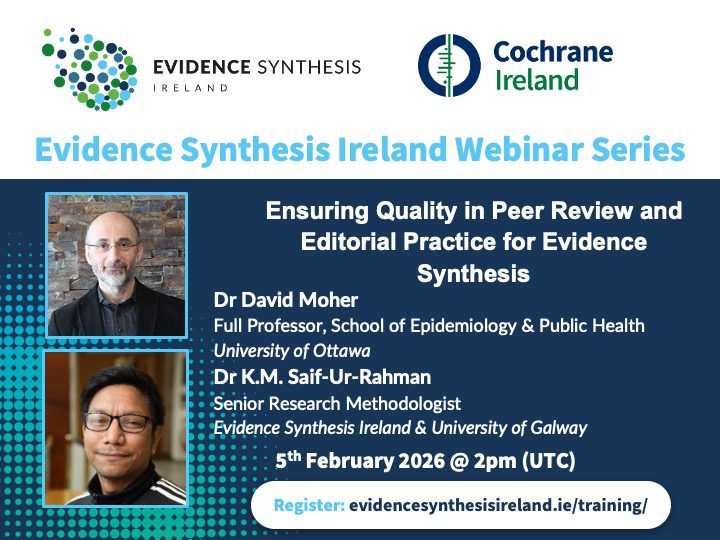
more
Registration
CLICK HERETime
(Thursday) 2:00 pm - 3:00 pm
Location
ONLINE
Event Details
Background: This series of workshops will provide reviewers, at the beginning of their journey in conducting a Qualitative Evidence Synthesis (QES)
Event Details

Background:
This series of workshops will provide reviewers, at the beginning of their journey in conducting a Qualitative Evidence Synthesis (QES) with a comprehensive overview of the methodology and methods including a Cochrane QES reviews. The series will offer insights into the development of a protocol, introducing participants to the methods of question generation, identification of included studies, data extraction and synthesis, the GRADECERQual assessment of confidence in the findings, and presentation the review for dissemination.
Aim:
The purpose of these workshops is to familarise all participants with the steps involved in conducting a Qualitative Evidence Synthesis.
We have designed these workshops as a companion series to allow attendees to apply what they have learned, enabling them to gain practical experience before progressing to the next stage of the process.
Objective:
The objectives of the workshops are intended to provide participants with an understanding of the methods of QES and equip them with the practical skills needed to conduct such a syntheses effectively.
Workshop 1: will provide an Introduction to QES, including overview. We will explore how you can focus your review question and search for qualitative evidence.
Workshop 2: will highlight the methods of screening and inclusion processes including selecting studies. We will demonstrate how data are extracted for a QES and a Quality Assessment is conducted.
Workshop 3: will delve into choosing a method of synthesis, and demonstrate how to synthesisinse qualitative data and present the findings
Workshop 4: we will illustrate the process of conducting an assessment of confidence in the findings of the QES using the GRADECERQual approach, and explore methods of writing up a review for dissemination.
Learning outcomes:
The learning outcomes for participants in this series should support them to:
- develop an understanding of the principles of QES and its importance in research
- define a research question suitable for QES
- explore methods for systematically searching and selecting relevant qualitative studies
- develop the skills to assess the quality of qualitative research studies
- gain proficiency in data extraction and methods of qualitative data synthesis
- learn how to conduct an assessment of confidence in the findings of a QES
- explore strategies for presenting and reporting the findings of a QES
Teaching strategies:
The workshops will consist of a mixture of short presentations and discussions led by members of the ESI Teaching Faculty, covering each of the methods of a QES. Breakout rooms will be used for small group activities based around worked examples and exercises. These activities will provide participants with the opportunity to discuss and develop their own skills and understanding. Participants will also be provided with a reading list and additional resources.
Places: 30 places available for individuals who are resident on the island of Ireland
Workshop 2 fee: General €40; Student €20
Overall fee for 4 workshops: General €120; Student €60
Skill level: Introductory
Prerequisites: Knowledge of qualitative research methodologies and methods
Target Audience:
Facilitators
Prof. Pauline Meskell, Head of Department of Nursing and Midwifery, University of Limerick
Dr Linda Biesty, Associate Professor (Midwifery), University of Galway
*If your type of ticket is sold out, please join the waitlist or contact us at esi@universityofgalway.ie
more
Additional Information
More informationRegistration
Click HereTime
(Thursday) 10:00 am - 12:00 pm
Location
ONLINE
Event Details
To register, CLICK HERE IN COLLABORATION WITH THE EUROPEAN METHODS WEBINAR SERIES Systematic reviews of randomized controlled trials (RCTs) aim to include all eligible studies in evidence
Event Details
To register, CLICK HERE
IN COLLABORATION WITH THE EUROPEAN METHODS WEBINAR SERIES
Systematic reviews of randomized controlled trials (RCTs) aim to include all eligible studies in evidence synthesis. Unfortunately, it is now clear that many systematic reviews contain so-called problematic studies. A study could be problematic due to research misconduct (including falsification or fabrication of data) or otherwise due to critical errors. Regardless of the reason for the problems, it is important to identify and remove these studies from systematic reviews to prevent them from influencing healthcare decisions. The INSPECT-SR (INveStigating ProblEmatic Clinical Trials in Systematic Reviews) tool has been developed for the purpose of assessing trustworthiness of RCTs in order to identify problematic trials. This interactive webinar will introduce the INSPECT-SR tool by way of application to a published clinical trial. Participants will have the opportunity to use INSPECT-SR to perform trustworthiness checks themselves and will learn how the tool can be incorporated when undertaking a systematic review.
Speaker:
Jack Wilkinson is a Senior Lecturer in Clinical Trials at University of Manchester. His research interests include clinical trials and evidence synthesis, and he is Statistical Editor for Cochrane Gynaecology and Fertility. He has extensive experience in the conduct of integrity investigations for journals and publishers, and he leads the INSPECT-SR project, which developed a tool for the assessment of trial trustworthiness.
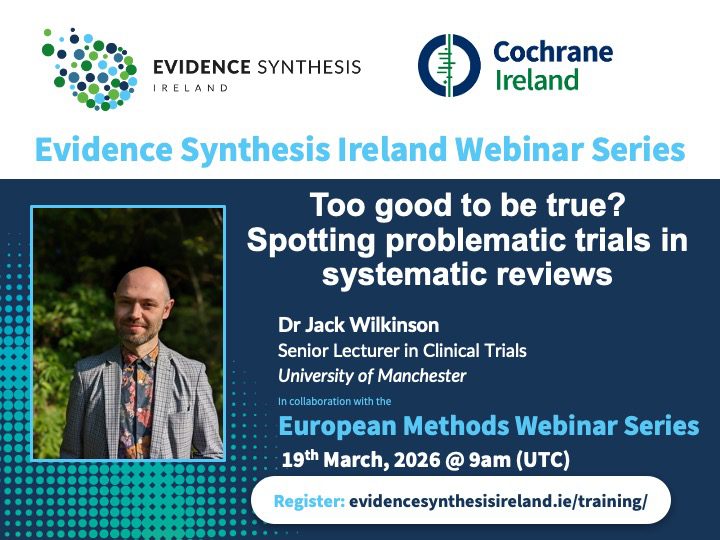
more
Registration
CLICK HERETime
(Thursday) 1:00 pm - 2:00 pm
Location
ONLINE
march 2026
Event Details
This two-day workshop guides participants through the comprehensive GRADE methodology, from defining PICO questions and outcomes to creating Summary of Findings tables using GRADEpro GDT software. Through a combination of
Event Details
This two-day workshop guides participants through the comprehensive GRADE methodology, from defining PICO questions and outcomes to creating Summary of Findings tables using GRADEpro GDT software. Through a combination of lectures and hands-on exercises, participants will learn how to assess evidence certainty by evaluating key domains, including methodological limitations, inconsistency, indirectness, imprecision, and publication bias. The workshop also covers evidence upgrading criteria and provides practical experience in creating Summary of Findings tables for systematic reviews of healthcare interventions.
Attendees will be enabled to:
- understand the basic principles of the GRADE approach and be able to comprehend the individual steps in the assessment of the evidence and their impact on the strength of the recommendation
- be able to create an evidence profile for a therapeutic intervention based on a systematic review
- have a basic understanding of the GRADE Software
Dates: 9th & 10th March 2026
Time: 10:00 – 16:00
Places: 25 available for individuals who are resident in Ireland & Northern Ireland
Location: Riddell Hall, Queens University Belfast
Prices: General €250; Student €140
Prerequisites: Knowledge in conducting and/or using systematic reviews as well as the basic principles of evidence-based healthcare, and the critical appraisal of research studies, especially RCTs
Skill Level: Introductory
Target Audience: Systematic review authors, guideline developers, health and social care professionals, academics, researchers, postgraduate students, decision makers, Evidence Synthesis Ireland Fellows and other professionals
Facilitators:
Prof. Declan Devane, Director of Evidence Synthesis Ireland & Cochrane Ireland, Professor of Health Research Methodology, University of Galway
Dr KM Saif-Ur-Rahman, Director of Ireland GRADE Network, Evidence Synthesis Methods Lead, Evidence Synthesis Ireland and Senior Research Fellow, University of Galway
Dr Nuala Livingstone, Senior Quality Assurance Editor, Cochrane Editorial and Methods Department
more
Additional Information
Click hereRegistration
Click hereTime
9 (Monday) 10:00 am - 10 (Tuesday) 4:00 pm
Event Details
Background: This series of workshops will provide reviewers, at the beginning of their journey in conducting a Qualitative Evidence Synthesis (QES)
Event Details

Background:
This series of workshops will provide reviewers, at the beginning of their journey in conducting a Qualitative Evidence Synthesis (QES) with a comprehensive overview of the methodology and methods including a Cochrane QES reviews. The series will offer insights into the development of a protocol, introducing participants to the methods of question generation, identification of included studies, data extraction and synthesis, the GRADECERQual assessment of confidence in the findings, and presentation the review for dissemination.
Aim:
The purpose of these workshops is to familarise all participants with the steps involved in conducting a Qualitative Evidence Synthesis.
We have designed these workshops as a companion series to allow attendees to apply what they have learned, enabling them to gain practical experience before progressing to the next stage of the process.
Objective:
The objectives of the workshops are intended to provide participants with an understanding of the methods of QES and equip them with the practical skills needed to conduct such a syntheses effectively.
Workshop 1: will provide an Introduction to QES, including overview. We will explore how you can focus your review question and search for qualitative evidence.
Workshop 2: will highlight the methods of screening and inclusion processes including selecting studies. We will demonstrate how data are extracted for a QES and a Quality Assessment is conducted.
Workshop 3: will delve into choosing a method of synthesis, and demonstrate how to synthesisinse qualitative data and present the findings
Workshop 4: we will illustrate the process of conducting an assessment of confidence in the findings of the QES using the GRADECERQual approach, and explore methods of writing up a review for dissemination.
Learning outcomes:
The learning outcomes for participants in this series should support them to:
- develop an understanding of the principles of QES and its importance in research
- define a research question suitable for QES
- explore methods for systematically searching and selecting relevant qualitative studies
- develop the skills to assess the quality of qualitative research studies
- gain proficiency in data extraction and methods of qualitative data synthesis
- learn how to conduct an assessment of confidence in the findings of a QES
- explore strategies for presenting and reporting the findings of a QES
Teaching strategies:
The workshops will consist of a mixture of short presentations and discussions led by members of the ESI Teaching Faculty, covering each of the methods of a QES. Breakout rooms will be used for small group activities based around worked examples and exercises. These activities will provide participants with the opportunity to discuss and develop their own skills and understanding. Participants will also be provided with a reading list and additional resources.
Places: 30 places available for individuals who are resident on the island of Ireland
Workshop 3 fee: General €40; Student €20
Overall fee for 4 workshops: General €120; Student €60
Skill level: Introductory
Prerequisites: Knowledge of qualitative research methodologies and methods
Target Audience:
Facilitators
Prof. Pauline Meskell, Head of Department of Nursing and Midwifery, University of Limerick
Dr Linda Biesty, Associate Professor (Midwifery), University of Galway
*If your type of ticket is sold out, please join the waitlist or contact us at esi@universityofgalway.ie
more
Additional Information
More informationRegistration
Click HereTime
(Thursday) 10:00 am - 12:00 pm
Location
ONLINE
Event Details
To register, CLICK HERE This webinar will offer a sneak-preview of the soon to be published latest updates to the Cochrane Handbook chapter on prospective, collaborative
Event Details
To register, CLICK HERE
This webinar will offer a sneak-preview of the soon to be published latest updates to the Cochrane Handbook chapter on prospective, collaborative approaches to evidence synthesis. Participants will learn about prospective meta-analysis (PMA) and other collaborative approaches, including when to use them, their key advantages, and best practices for planning, conducting, reporting, and disseminating findings. Using practical examples, the session will demonstrate strategies for systematically searching trial registries, harmonising study designs and outcomes across trials, and managing large, global collaborations effectively.
Speaker:
Dr Kylie Hunter is a Research Fellow and co-lead of the NextGen Evidence Synthesis Team at the NHMRC Clinical Trials Centre, University of Sydney. She is Associate Convenor of the Cochrane Prospective Meta-Analysis Methods Group and was recently elected to the Cochrane Methods Executive. Her research focuses on collaborative evidence synthesis methodologies, in particular, individual participant data and prospective meta-analysis. She has led methods innovations that have shaped Cochrane guidance and global best practice, including guidance for searching clinical trials registers and the development of an individual participant data integrity tool. Dr Hunter applies these innovative methods to address high-priority research questions, with a particular focus on child health.
Prof. Anna Lene Seidler is Professor for Health Equity at University Medical Center Rostock and German Center for Child and Adolescent Health. She is also Honorary Affiliate at the NHMRC Clinical Trials Center at the University of Sydney, Honorary Principal Research Fellow at University College London, and Convenor and primary contact of the Cochrane Prospective Meta-Analysis Methods Group. Prof Seidler has made major research contributions to the field of methods development for next generation evidence synthesis approaches, such as prospective meta-analysis, and individual participant data meta-analysis. The next generation evidence synthesis approaches she develops are geared toward moving beyond the one-size-fits all approach and toward understanding differential health system needs for different population groups (e.g. by socio-economic position, for rural populations, or for Indigenous health).
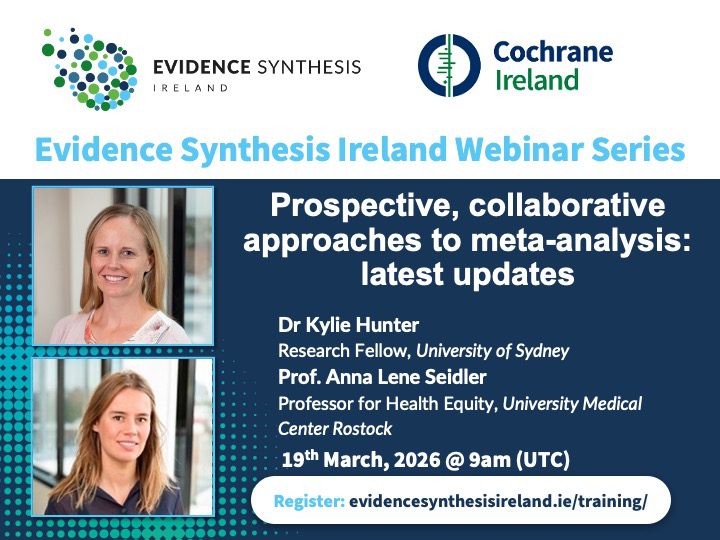
more
Registration
CLICK HERETime
(Thursday) 9:00 am - 10:00 am
Location
ONLINE
april 2026
Event Details
Background: This series of workshops will provide reviewers, at the beginning of their journey in conducting a Qualitative Evidence Synthesis (QES)
Event Details

Background:
This series of workshops will provide reviewers, at the beginning of their journey in conducting a Qualitative Evidence Synthesis (QES) with a comprehensive overview of the methodology and methods including a Cochrane QES reviews. The series will offer insights into the development of a protocol, introducing participants to the methods of question generation, identification of included studies, data extraction and synthesis, the GRADECERQual assessment of confidence in the findings, and presentation the review for dissemination.
Aim:
The purpose of these workshops is to familarise all participants with the steps involved in conducting a Qualitative Evidence Synthesis.
We have designed these workshops as a companion series to allow attendees to apply what they have learned, enabling them to gain practical experience before progressing to the next stage of the process.
Objective:
The objectives of the workshops are intended to provide participants with an understanding of the methods of QES and equip them with the practical skills needed to conduct such a syntheses effectively.
Workshop 1: will provide an Introduction to QES, including overview. We will explore how you can focus your review question and search for qualitative evidence.
Workshop 2: will highlight the methods of screening and inclusion processes including selecting studies. We will demonstrate how data are extracted for a QES and a Quality Assessment is conducted.
Workshop 3: will delve into choosing a method of synthesis, and demonstrate how to synthesisinse qualitative data and present the findings
Workshop 4: we will illustrate the process of conducting an assessment of confidence in the findings of the QES using the GRADECERQual approach, and explore methods of writing up a review for dissemination.
Learning outcomes:
The learning outcomes for participants in this series should support them to:
- develop an understanding of the principles of QES and its importance in research
- define a research question suitable for QES
- explore methods for systematically searching and selecting relevant qualitative studies
- develop the skills to assess the quality of qualitative research studies
- gain proficiency in data extraction and methods of qualitative data synthesis
- learn how to conduct an assessment of confidence in the findings of a QES
- explore strategies for presenting and reporting the findings of a QES
Teaching strategies:
The workshops will consist of a mixture of short presentations and discussions led by members of the ESI Teaching Faculty, covering each of the methods of a QES. Breakout rooms will be used for small group activities based around worked examples and exercises. These activities will provide participants with the opportunity to discuss and develop their own skills and understanding. Participants will also be provided with a reading list and additional resources.
Places: 30 places available for individuals who are resident on the island of Ireland
Workshop 4 fee: General €40; Student €20
Overall fee for 4 workshops: General €120; Student €60
Skill level: Introductory
Prerequisites: Knowledge of qualitative research methodologies and methods
Target Audience:
Facilitators
Prof. Pauline Meskell, Head of Department of Nursing and Midwifery, University of Limerick
Dr Linda Biesty, Associate Professor (Midwifery), University of Galway
*If your type of ticket is sold out, please join the waitlist or contact us at esi@universityofgalway.ie
more
Additional Information
Coming SoonRegistration
Click HereTime
(Thursday) 10:00 am - 12:00 pm
Location
ONLINE
Event Details
To register, CLICK HERE This webinar will demonstrate how evidence synthesis converts dispersed studies into clear, timely guidance that meets policy demands and makes research usable.
Event Details
To register, CLICK HERE
This webinar will demonstrate how evidence synthesis converts dispersed studies into clear, timely guidance that meets policy demands and makes research usable. It will explain how to read the policy landscape and align outputs with decision cycles. Participants will learn to identify government priorities by matching research needs to policy agendas and Programme for Government commitments, and to recognise opportunities within the Oireachtas by linking syntheses to forthcoming bills and parliamentary hearings. Engagement strategies include making research personal by connecting findings to lived problems and service delivery, and building relationships through informal networks alongside formal submissions. The webinar will emphasise that concise syntheses, supported by briefing papers and dialogue, are essential to bridge the research–policy gap. Attendees will leave with practical tools to map priorities, spot legislative windows, and deliver targeted syntheses that improve usability and influence.
Speaker:
Denis Naughten is a leading advocate for the integration of technology into policy and legislation worldwide. As Chair of the Inter-Parliamentary Union (IPU) Working Group on Science and Technology, Denis played a key role in developing the global Ethical Charter on Science & Technology. This initiative offers a framework for regulating emerging technologies, including artificial intelligence (AI), and addresses their ethical implications. He is a Fellow of the World Academy of Art & Science and a member of the High-Level Advisory Group to the Technical & Economic Assessment Panel of the UN’s Climate & Clean Air Coalition. With over 27 years as a TD, serving as Minister for Communications, Climate Action and Environment, representing Ireland on the Council of the European Union, chairing two Oireachtas Committees, and holding numerous senior roles in politics and parliament, Denis now runs a consultancy focused on translating research into actionable policy for societal improvement.
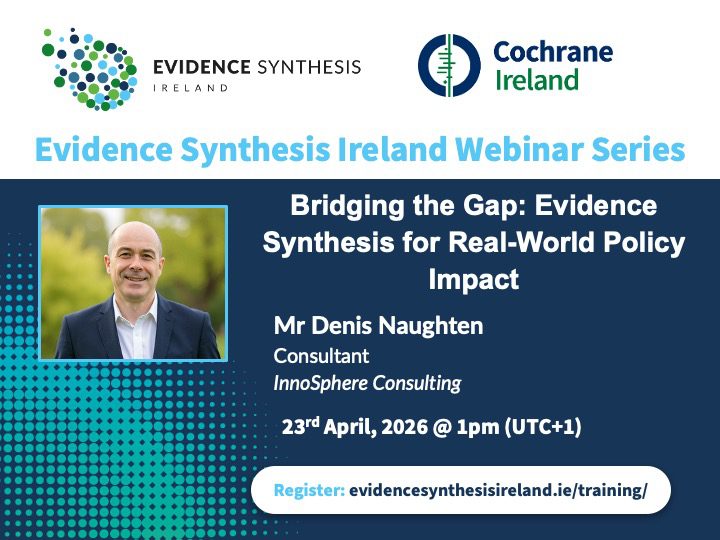
more
Registration
CLICK HERETime
(Thursday) 1:00 pm - 2:00 pm
Location
ONLINE
Event Details
Dates: 30th April 2026 Time: 09:30 – 16:00 Places: 42 places available for individuals who are resident in Ireland & Northern Ireland Location: Riddel Hall, Queen’s University Belfast Prices: General €50; Student €30 Aim: The
Event Details
Dates: 30th April 2026
Time: 09:30 – 16:00
Places: 42 places available for individuals who are resident in Ireland & Northern Ireland
Location: Riddel Hall, Queen’s University Belfast
Prices: General €50; Student €30
Aim: The aim of this workshop is to provide an introduction to the realist approach and how to do a realist review.
Objectives:
- The objectives of this workshop are to:
- Appreciate the key underpinning principles of a realist approach
- Understand ‘how’ to do a realist review
- Be able to identify a ‘good’ from a ‘not so good’ realist review to help build confidence in using a realist approach
Teaching strategies:
The workshop will consist of a mixture of short presentations on the underpinning philosophy of the realist approach, how to do a realist review, and what does a ‘good’ review look like. There will be plenty of practical sessions and time for questions and feedback from our local, national and international realist experts.
Requisites: Attendees must bring their laptop and also bring along an outline of an intervention, policy or programme that they would like to focus on during the practical sessions
Skill Level: Introductory
Target Audience: PhD students, Post-Doc Researchers and academics who would like to learn more about conducting realist reviews
Facilitators:
Dr Tracey McConnell is a Lecturer in Chronic Illness and Palliative Care in the School of Nursing and Midwifery, Queen’s University Belfast. She is also an Honorary Marie Curie Senior Research Fellow. She has been using realist approaches for over 10 years across mental health, palliative care and music therapy research. She currently leads an NIHR funded multi-site UK wide realist evaluation and has successfully completed two NIHR funded realist syntheses supported by Prof Geoff Wong. Tracey has supervised MSc and PhD students using a realist approach and is keen to build a realist support network across the Island of Ireland.
Geoff Wong is Professor of Primary Care in the Nuffield Department of Primary Care Health Sciences at the University of Oxford. He is an internationally and nationally recognised expert in realist review and evaluation. He has extensive expertise in conducting and providing methodological support for both approaches as well in their methodological development. He led the two UK National Institute of Health Research funded projects that developed quality and reporting standards, and training materials for realist reviews and realist evaluations (www.ramesesproject.org). He works part time as a GP in the NHS.
Dr. Brynne Gilmore, Assistant Professor Health Systems in University College Dublin, is an applied global health researcher who uses theory driven methodologies to evaluate and improve health programmes. She has been using realist reviews and evaluations for over 10 years and across numerous contexts. She has conducted or contributed to over 10 realist reviews or rapid realist reviews and seven realist evaluations. Brynne has written several realist methodology papers and book chapters, including on data analysis and synthesis, advisory groups and article appraisal. She is currently part of a team developing quality reporting standards for realist reviews, and is an advisor on two large international realist projects. She is a frequent peer reviewer and grant reviewer for realist projects, has supervised PhD students using realist methodologies and has examined realist PhDs.
Alejandro Argüelles Bullón, GMBPsS, MRSPH, EMCC, is a mental health researcher and Mental Health PhD student at Lancaster University (UK), where he received the Dean’s Ben Booth Award for Outstanding Contribution. His work focuses on realist approaches to mental health, with a strong emphasis on accessibility, cultural inclusion, and the role of lived-experience researchers in academic organisations. He is currently affiliated with Lancaster University and the University of Victoria (Canada) and is involved in national and international collaborations. Alejandro is the founder of RAÍCES, the first global Spanish-speaking realist research community, where he leads initiatives that promote inclusive, collaborative and linguistically accessible research across the Spanish-speaking world. He is also the host of The Realist Lens, a podcast dedicated to making realist approaches accessible and promoting interdisciplinary dialogue through open, community-driven conversations. Within just a few months, the podcast has gained over 600 subscribers and more than 9,000 views.
more
Additional Information
Click hereRegistration
Click hereTime
(Thursday) 9:30 am - 4:00 pm
may 2026
Event Details
To register, CLICK HERE This webinar will present GRADE Guidance 44, which provides a structured, practical approach to using randomised controlled trials (RCTs) and non-randomised studies
Event Details
To register, CLICK HERE
This webinar will present GRADE Guidance 44, which provides a structured, practical approach to using randomised controlled trials (RCTs) and non-randomised studies of interventions (NRSIs) in evidence syntheses of health interventions. While RCTs remain the preferred source of evidence, many clinical, public health, and policy questions require consideration of observational evidence. The session will walk participants through the key principles and four-step framework proposed in the guidance, including assessing certainty of evidence, defining decision thresholds, evaluating congruency of effect estimates, and determining when and how evidence from different study designs can be integrated—or should remain separate. Real-world examples will be used to illustrate common challenges and decision points faced by reviewers informing guidelines and HTAs. The webinar is aimed at systematic reviewers, guideline developers, HTA analysts, and methodologists seeking practical, defensible approaches to combining evidence from diverse study designs using GRADE.
Speaker:
Carlos A. Cuello-Garcia, MD, PhD, is an Assistant Professor in the Department of Health Research Methods, Evidence, and Impact at McMaster University and a Clinical Research Officer at Canada’s Drug Agency (CDA-AMC). He is an active member of the GRADE Working Group and has contributed to multiple official GRADE guidance documents, including recent guidance on integrating randomised and non-randomised studies of interventions (guidance 44). Carlos has extensive experience in evidence synthesis, health technology assessment, and clinical guideline development, with a particular focus on certainty of evidence and decision-making frameworks. His work bridges methodological research and applied decision-making in real-world policy and regulatory contexts. He has taught and presented internationally on GRADE methods, risk of bias, and the use of observational evidence alongside randomised trials.
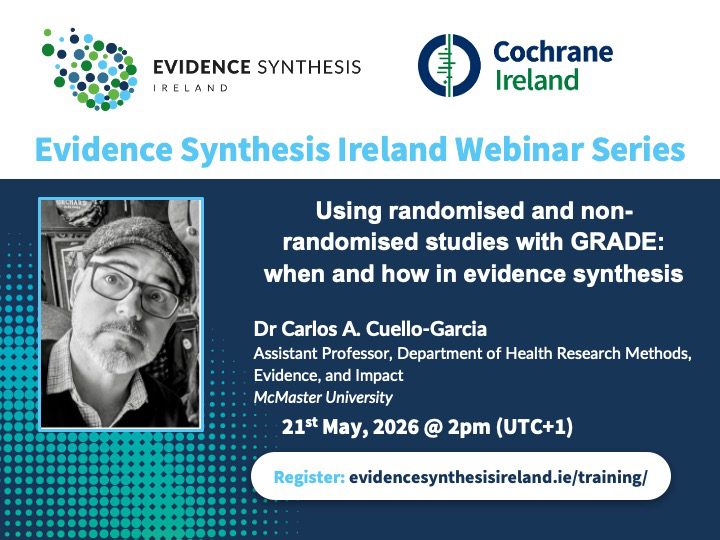
more
Registration
CLICK HERETime
(Thursday) 2:00 pm - 3:00 pm
Location
ONLINE
Event Details
Overview: Systematic reviews and evidence syntheses are powerful tools that compile and evaluate all relevant research on a particular question, providing a high-quality evidence base for decision-making. They are crucial for
Event Details
Overview:
Systematic reviews and evidence syntheses are powerful tools that compile and evaluate all relevant research on a particular question, providing a high-quality evidence base for decision-making. They are crucial for informing policy, guiding practice, and identifying future research needs—not just in health but across various sectors.
Join us for our Summer School at the University of Galway from May 26th to 28th, 2026, for a hands-on three-day summer school on “Introduction to Evidence Synthesis.” This course is tailored for beginners and those looking to refresh their skills. While the focus is on health, the methods taught are applicable in multiple fields. Through interactive lectures, discussions, and practical exercises, you’ll learn how to conduct systematic reviews and evidence syntheses that can influence research and policy decisions.
Learning outcomes:
By the end of this summer school participants will:
- Understand the importance and principles of evidence synthesis, including systematic reviews.
- Understand how to formulate clear and focused research questions using appropriate frameworks.
- Learn how to develop a systematic review protocol following established guidelines.
- Know how to conduct comprehensive literature searches across multiple databases and sources.
- Gain knowledge of selecting relevant studies and extracting necessary data effectively.
- Understand the principles of assessing the risk of bias in different types of studies using standard tools.
- Understand the principles of both quantitative and qualitative synthesis methods.
- Be introduced to tools like GRADE to evaluate the certainty of evidence.
- Understand the application of these methods to their own research or professional practice across various sectors.
- Connect with peers and experts.
Audience:
Beginners and those with some knowledge seeking to learn or refresh their skills in evidence synthesis, Systematic review authors, guideline developers, health and social care professionals, academics, researchers, postgraduate students, policy and decision-makers, Evidence Synthesis Ireland Fellows and other professionals, anyone interested in evidence synthesis methods.
Pre-requisites:
- Laptop required
- A basic understanding of research methods (not limited to health research)
- An interest in learning or enhancing knowledge on systematic reviews and evidence synthesis
Places:
100 available for individuals who are resident in Ireland & Northern Ireland
Tickets:
General admission (researchers, academia, clinicians etc): €300
Student: €200
Industry: €600
Public and patients: Please email esi@universityofgalway.ie
more
Additional Information
Click hereRegistration
Click hereTime
26 (Tuesday) 9:30 am - 28 (Thursday) 3:45 pm
Location
Alice Perry School of Engineering, University of Galway
University Road
If you find the charge for places a barrier to attending:
- Please let us know as complimentary places can be made available in certain circumstances
- For example, eligibility: public, patients or carers not affiliated/supported by an organisation, unemployed and fully retired people with no paid work e.g.
- We have limited free places for individuals from low to middle income countries on online workshops
- Concessions are not offered to businesses, individuals funded by an organisation, or large companies.
- Email esi@universityofgalway.ie for more details




